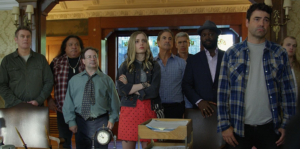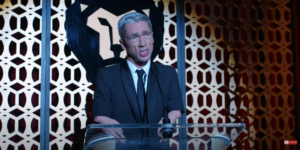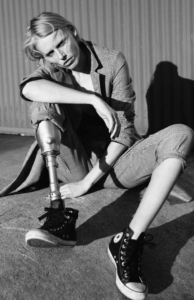TV-Series Review
Loudermilk – Representation of Disability in a Dramedy
Kshitij Pipaleshwar
What comes to mind when you think of disabled characters on screen? How do you imagine them to be? What roles are they playing? Are they the ones bringing in comedic relief or is the comedic relief being made at their expense? Does the person who comes to your mind is a character with visible disability who has had a hard life, which makes them a ‘wise’ sidekick with profound insights on life, who further the protagonist’s arc and display unquestioning loyalty to the protagonist? When was the last time you saw a character with a disability cuss on the screen or challenge someone to settle a dispute in a boxing ring? Loudermilk is a refreshing attempt by Farrelly brothers that portrays an inclusive cast without categorising them as characters to be pitied. This diverse cast is funny, sarcastic, and challenges the widely held belief that disability equals innocence. It is a far cry from the common trope of infantilization of disabled characters. Read on to know why it has been winning hearts and accolades.
Loudermilk has been a sleeper hit. This lesser known show has been garnering critical acclaim and cult like status, chiefly for its dry, foul-mouthed anti-hero protagonist, Sam Loudermilk. The show establishes in less than 5 minutes that it is edgy, hard hitting and witty. Sam is a recovering alcoholic and leads a group styled after Alcoholics Anonymous called ‘Sober Friends’. The series follows the ragtag bunch of recovering substance addicts and alcoholics as they navigate sobriety, growth, life, relationships and recovery.

While the first thing that strikes you about the show is that it unapologetically indulges in caustic humour, the second thing is how normalised is the representation of disability and how inclusive is its cast. As we meet the motley crew of Sober Friends circle, we are introduced to Roger (played by the iconic Mat Fraser) and as a pleasant surprise he is treated as just another character with no overt references to his disability or jokes at its expense. He is just as flawed as the rest of them – a recovering addict. Roger, the pragmatic, sensitive, well-adjusted person (when compared to others in the group), is not just a caricature or a token character. The seamless integration of Roger in the group seems less surprising when you learn the show is produced by the Farrelly Brothers, Peter and Bobby, who have been creating shows and movies with an inclusive cast and have been great allies in championing the cause of representation of disability in the media. The show, not just, normalises disability but also highlights the problematic nature of using people with disabilities for inspiration porn.

Roger’s disability is not played for sympathy or laughs. It is a part of his identity, just as being British, being a former rock band member or being a recovering addict is. If anything, he comes out looking like a badass rockstar (quite literally). There are two episodes that have Roger and his disability as one of the major plotlines of the episode.
In the first, his band and he are offered a hefty sum of money by an alcoholic beverage company for their popular song. Roger is conflicted because his music would be promoting an alcoholic beverage. When Sam urges Roger to meet his former bandmates, Roger drives Sam and himself in a rather expensive luxury car that is gifted to Sam. There is no applause, no fawning, no pat on the back for Roger just because he can drive. When Roger’s band agrees to lend their music, and film for the commercial, the client representing the beer company is shocked to see Roger and his disability. Initially, the client wants him removed and instructs his staff member to do so. The band starts practising and they watch in awe as Roger works his magic on the drums. The client is so impressed by Roger’s skills that he decides to use the combination of Roger’s disability and talent as a way to promote their beer. Roger, meanwhile, has a change of heart and decides that he would not want his music to be used to promote alcoholic beverages and storms out.

One of the greatest wins for disability representation is the 7th episode in season 3. Claire sketches a portrait of Roger with wings and wins the best sketch award at her art class. Roger is curious to know why Claire drew him with wings and Claire struggles to not mention that is drawn in the likeness of him rising above his disability. The teacher requests Roger’s presence in the class and focuses on Roger, urging Roger to interact with the students, and completely ignores Claire. Roger meets the teacher’s sister who happens to be a music producer and is one of the organisers of ‘The Bravey Awards’. Without wanting to learn more about Roger, his life etc., she proposes that they felicitate him. Roger is eager. Sam learns of it, he sarcastically questions Roger if he deserves the award and Roger deflects the question.
When Roger steps on stage to deliver his acceptance speech, Roger mentions that he does not deserve the award (the audience thinks he is being modest and cheers on). He elaborates that he wrote a self serving acceptance speech last night, ‘to keep his blinders on and lap up the ego stroking praise’. He adds that while, “he appreciates the gesture behind honouring him but giving him an award just because he is disabled is designed only to make the members in the audience (and by extension the organisers, non-disabled people) feel good. The award makes him feel pretty lousy as it demonstrates how low their expectations are from him, like he deserves an award for brushing his teeth with his disfigured short arms. He adds that he used to brush several times a day to keep the smell of booze away.” When audience members laugh good humouredly, he interjects and continues, “No, not a joke, I am an alcoholic but have been sober for a little while now. But I spent a large part of my life escaping with booze and there is nothing heroic about that, but tonight, it is just inspiration porn. Stella Young, an Australian activist coined that term. Porn, yes, because it is all about objectifying people like me and her, so that you can say to each other – well my life sucks but it could be worse, just look at the bloke with short arms. But I am as much to blame as you so I feel uncomfortable accepting it. I fooled myself into believing I deserve this award for my music and the truth is, I am a good drummer but I am not a great one, so I am sorry I can’t accept your bravery award.”
The episode ends with a heartfelt conversation between Claire and him, where he reiterates that while it is true his life is harder than the most, it is not fair that the bar for him is so low. Perhaps, in the first of sorts, this serves as a mirror to the audience to question their own notions of why they are quick to bestow the title of ‘inspiring/motivating/courageous’ on people with disabilities. When set within the premise of handing out an actual award, the absurdity of such self-congratulatory acts become all too more transparent. Roger’s monologue becomes one of the most poignant moments of the show.


Roger is not the only character with a disability on the show. The show also features Edward Barbanell (Charlie), Sofiya Cheyenne (Louise), Nic Novicki (David, Louise’s ex), Lauren Wasser (Memphis, Loudermilk’s ex wife) and Cassandra Naud (Cappy). Charlie with sassy comebacks, abrasive language, and devil-may-care attitude is not your typical demure, meek person with down syndrome who can be bossed around. Lousie is treated with much grace, respect and dignity. She is smart, funny, stands up for herself. Cappy tries to give her dad another chance and is shown to be professionally doing well for herself. Nic who plays David is a leather jacket donning, motorcycle riding, stereotypical cool guy, who is intimidating, and not afraid to take on someone twice his height. Memphis is spontaneous, shown to love life, and doesn’t let her accident deter her from partying. In fact, in line with the depiction of people with disabilities as wholesome individuals and not ‘perfect victims’, Ben (Loudermilk’s roommate) and Memphis are shown to have a romantic relationship and marry (a move that hurts Loudermilk and transgresses the unsaid cultural norm of not being romantically involved with your partner’s best friend or ex wife).

A popular trophe is that of depicting characters with disabilities as ‘wise’. Encountering an accident that results in the character leading a life with disability (or having lived a life as a person with disability) is shown to have a life changing spiritual impact on them. They chime in with a wise word, every now and then to redirect the protagonist’s moral compass and guide them. Not in this show. While the drunk driving accident pushes Loudermilk towards sobriety, Memphis did not want them (Loudermilk and her) to change their ways even if she lost her leg because of it. The characters with disability are played with actors with disability and are carefully fleshed out individuals and not just appearing as ‘blink-and-you-miss-it’ characters who chime in with a piece of wisdom.
Charlie is shown to collude with Loudermilk and deceive Claire to restore her faith in humanity. Charlie swears, and has no moral qualms about being a drunk cab driver ferrying passengers across the city in an inebriated state. This too challenges the stereotype that people with disabilities are inherently good at heart/ remain in a state of child-like innocence. Not once are they the subjects of pity or sympathy. Loudermilk, at the heart of it, is after all a dramedy- drama + comedy. The show works because the characters all work together and off each other and deliver.
A reddit user (@emmaj3) sums it the best when they write, “As an obviously disabled person I have really enjoyed the unfiltered but natural insertion of disability into the background of the show. I feel represented but not patronised and it’s just so refreshing to see disabled people as more than just their disability, but rounded individuals with flaws like us all. Well done Loudermilk!”
With its inclusive casting, meaty storylines and non-stereotypical portrayal of disability and characters with disability, Loudermilk also received the Ruderman Family Foundation award. With talks of season 4 of the series underway, we look forward to diverse casting, greater inclusivity, and issues on the screen.